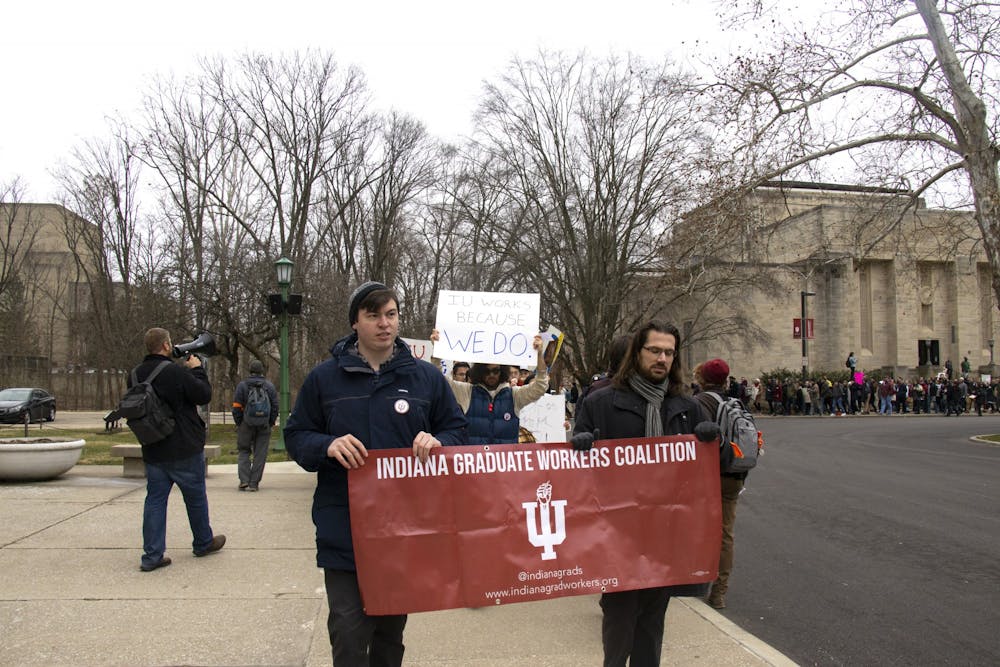Graduate student workers at IU teach nearly a third of all undergraduate classes, grade papers, assist in research and pay the school more than $1,000 a year to do this. The Indiana Graduate Workers Coalition demanded an end to mandatory fees, which are the fees charged to all IU students, nearly two years ago.
Graduate students formed the coalition in 2017 after a nationwide walk-out to protest fees at universities across the country. Since then, the coalition has spread a petition, led marches and organized town halls about the fees.
As indispensable employees of the university, graduate workers should not be forced to pay to work, and members of the IU community should support them in their efforts.
“If you teach, you’re essentially paying for the computers you use to teach undergraduates,” said Marisa Wieneke, a member of the Indiana Graduate Workers Coalition.
The coalition estimates that many graduate workers receive an annual pre-tax stipend of $15,750 and pay more than $1,000 in fees per year back to the university, but they are clear that some graduate workers make thousands of dollars less. The mandatory fees include a technology fee, activity fee, transportation fee, health fee and repair and rehabilitation fee, which helps pay for repairs and maintenance for university buildings and infrastructure. International graduate workers are forced to pay the international student fee, which comes out to more than $200 a semester.
With an official budget of more than $1 billion, the revenue from graduate workers’ mandatory fees accounts for less than 0.5% of IU’s budget. Meanwhile, the fees cost graduate workers nearly a month’s pay. Alongside other employee salaries and university expenses, losing graduate workers’ fee revenue appears miniscule. IU head football coach Tom Allen, the university’s highest paid employee, earns $3.9 million annually, and the newly constructed Metz Carillon tower cost $7 million to build.
With such staggering salaries and construction costs, the university cannot reasonably justify charging employees a fee to work. To make matters worse, the cost of fees increased from less than $800 in 2012 to more than $1,300 in 2017, significantly outpacing inflation.
Eliminating fees would ease graduate workers’ financial stress, but it would also show that the university values them as employees. IU must recognize that it cannot function without its graduate workers. It must realize that charging employees fees, such as the technology fee, is essentially akin to charging a cashier for access to a cash register.
"The plight of grad students living on stipends is something that happens on campuses across the country," IU spokesperson Chuck Carney told the Indianapolis Star in October.
IU officials were looking for ways to increase stipends to offset the fees, Carney told WTIU News last month.
Though mandatory fees are common at universities across the country, employees should never be forced to pay an employer for the right to work. Instead of improving working conditions for some of its most essential employees, IU has chosen to ignore the coalition’s demands and continue charging mandatory fees.
Among Big Ten universities, IU’s fees as a ratio of minimum stipends are the second highest, with a ratio of 13%, according to the coalition's website. The University of Nebraska has a ratio of 17%. The only Big Ten school with a ratio of less than 1% is Michigan State University.
Members of the IU community should support the coalition’s efforts and demand that the university eliminate mandatory fees for its employees. If you’re an undergraduate student, you’ve likely had a graduate worker teach your class or grade your paper. If you’re a faculty member, you’ve benefited from graduate workers' contribution to the university’s research and academic prestige.
The coalition’s petition has gathered nearly 2,000 signatures.
The coalition will continue to organize protests, but no event has been planned yet, Wieneke said. The coalition hopes to maintain pressure and continue to expand the coalition. In January, members of the coalition met with David Daleke, vice provost for graduate education and health sciences, to discuss the issue as roughly 450 people gathered outside in support.
“At protests and marches, the more solidarity and bodies we have the better,” Indiana Graduate Workers Coalition member Wieneke said. “If you’re tired of your TA looking sad all the time, please come. If you care about workers’ rights, we’d love to have you there.”
The collective action of graduate workers serves as a powerful example of students’ ability to improve the university. They have demonstrated the necessity of demanding and organizing around a shared vision of change. Through maintained pressure and the community’s support, they might just make progress.
Kyle Linder (he/him) is a junior studying journalism and international relations. He plans to pursue a career in media.






